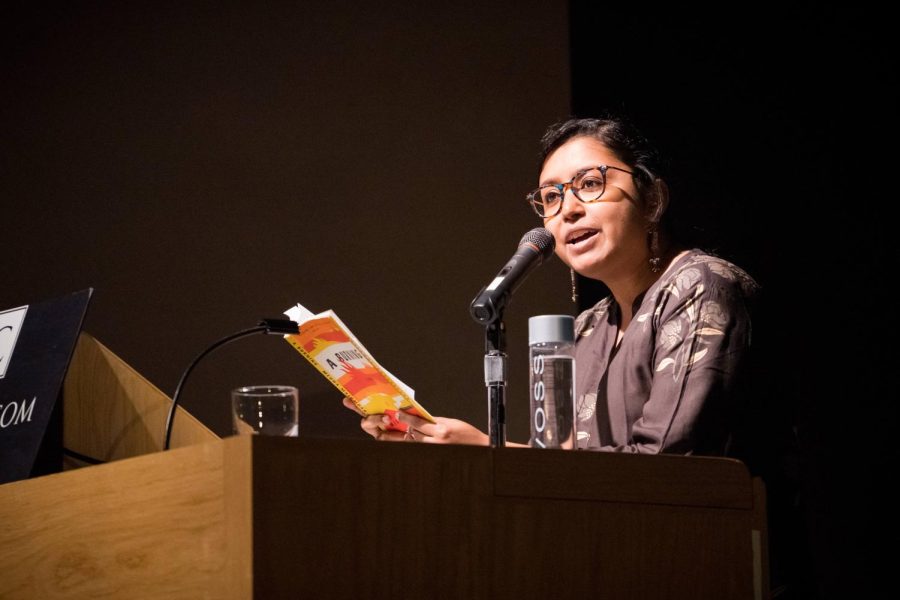‘A Burning’ reading event gives insight to future writers, activists
March 10, 2023
Megha Majumdar, with her creation in hand and a fire in her eyes, stands illuminated by the glow of the Harry Ransom Center’s stage, ready to share a vulnerable part of her life in reading her debut novel “A Burning.”
The Michener Writing Center hosted a book reading event Tuesday showcasing Majumdar’s novel, a New York Times bestseller that received nominations for the National Book Award and others. Political novel “A Burning” discusses issues such as class, power, corruption and justice through three characters set in contemporary India who must navigate a false terrorist attack accusation. In addition to reading her work, Majumdar spoke on crafting fictional stories, leaving audience members with a new understanding of authorship and creative writing.
While presenting her book, Majumdar said it tackles important social issues such as oppression in radical political climates, and said she felt inspired by real events in India. When working on her novel, Majumdar said she questioned many aspects of both Indian society and humanity as whole, and she kept those queries in mind while constructing the story.
“The book for me began from reading the news and thinking about the rise of extreme nationalism in India,” Majumdar said. “I wanted to ask, ‘How do people hold on to big dreams when the society around them makes this dangerous turn toward right wing nationalism? How do we find our moral centers? How do we live with humor and joy?’”
Despite “A Burning” presenting worldly issues, Majumdar said fiction cannot be reduced to a single message, so readers must feel the emotion behind her plot.
“(If) you have a question about the world, you ask it,” Majumdar said. “Sometimes, we mistakenly think that plot is about taming the creature … (but) it’s about opening the cage and setting the tiger free at just the right moment.”
Amongst the crowd, public relations freshman Anthony Okeke said Majumar’s advice helped him hone his craft as an aspiring writer.
“Everyone has an individual writing style,” Okeke said. “Even though you can learn a lot from what she’s written, you have to take into consideration your own creative writing process … then try and merge the two.”
Okeke said he believes Majumdar’s novel addresses topics that need to be more widely discussed.
“Class difference (is) something you see everyday, but it’s not something you necessarily recognize — especially (at UT). You see all of these different classes, and the way that they interact with each other, and seeing that thought process displayed elsewhere really intrigued me,” Okeke said. “It brings up a very important and relevant conversation that normally you’re not having.”
Eileen Chong, a fiction MFA student, felt especially intrigued by Majumdar’s advice to present a novel as a question rather than a solution, hoping to implement this in her work.
Chong said she felt inspired by Majumdar’s ability to make readers empathize with characters in the novel, especially when writing stories about characters from marginalized communities.
“The character Lovely, who is marginalized by society, just goes to show how, if you can make people care about someone, that’s the first step in healing anything,” Chong said.
As the Michener Writing Center continues to invite speakers and writers to UT, Chong said the speaker series gives a special opportunity to students who appreciate writing as an art form.
“It’s great to provide opportunities for writers and readers to meet because writing and reading are both such solitary endeavors,” Chong said. “Any time you can bring a room full of like-minded people together (and) arrange it because you have the resources, that’s always a positive thing.”




